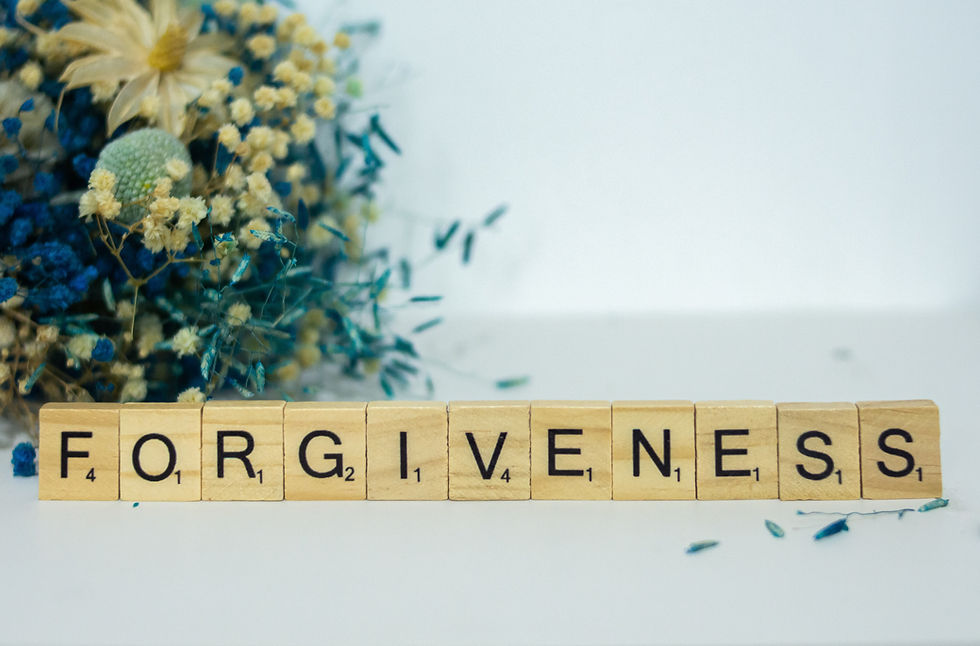The Power of Decisional Forgiveness: A Journey Toward Freedom
- Gina O'Neill
- Feb 27, 2025
- 3 min read

Forgiveness is often hailed as a virtue, a powerful tool for healing and reconciliation. Yet, the concept of forgiveness can be complex and multifaceted. Among the various approaches to forgiveness, decisional forgiveness stands out as a practical and intentional method for releasing the burdens of resentment and anger. In this blog post, we'll explore what decisional forgiveness is, how it works, and the profound impact it can have on our lives.
What is Decisional Forgiveness?
Decisional forgiveness is the conscious and deliberate choice to forgive someone who has wronged us. Unlike emotional forgiveness, which involves letting go of negative emotions, decisional forgiveness focuses on the decision to forgive as an act of will. It is about choosing to treat the offender with compassion and understanding, even if the emotional wounds are still healing.
The Steps of Decisional Forgiveness
Acknowledge the Hurt: The first step in decisional forgiveness is to acknowledge the pain and hurt caused by the offense. Recognizing the impact of the wrongdoing is essential for moving forward.
Make the Decision to Forgive: Decisional forgiveness is rooted in a conscious choice. It involves a commitment to forgive the offender, regardless of how we feel emotionally. This decision is an act of will, not necessarily an act of emotion.
Develop Empathy and Compassion: To forgive, it's important to understand the offender's perspective and circumstances. Developing empathy and compassion can help us see the situation from a broader viewpoint and recognize the humanity in the person who hurt us.
Commit to Forgiveness: Once the decision to forgive has been made, it's important to commit to this choice. This may involve writing a note to oneself, affirming the decision to forgive and reminding oneself of this commitment during moments of doubt.
Act in Line with Forgiveness: Decisional forgiveness requires us to act in ways that reflect our choice to forgive. This means refraining from seeking revenge or harboring resentment, and instead, treating the offender with kindness and respect.
The Benefits of Decisional Forgiveness
Emotional Freedom: While decisional forgiveness does not directly address emotions, it can pave the way for emotional healing. By releasing the need for retribution, we can create space for positive emotions to emerge.
Improved Relationships: Forgiveness can lead to the restoration of relationships. By choosing to forgive, we open the door to reconciliation and deeper connections with others.
Reduced Stress and Anxiety: Holding onto grudges and anger can take a toll on our mental and physical health. Decisional forgiveness can reduce stress and promote a sense of inner peace.
Personal Growth: Forgiveness is a journey that fosters personal growth and resilience. It helps us develop a greater capacity for empathy, compassion, and understanding.
Conclusion
Decisional forgiveness is a powerful and intentional approach to releasing the burdens of resentment and anger. By making a conscious choice to forgive, we can experience emotional freedom, improved relationships, and personal growth. Forgiveness is not about condoning the wrongdoing or forgetting the pain; it's about choosing to let go and move forward with compassion and understanding. As we embrace decisional forgiveness, we embark on a journey toward healing and wholeness.
Have you experienced the power of decisional forgiveness in your life? Share your thoughts and stories in the comments below!
References
Enright, R. D., & Fitzgibbons, R. P. (2000). Helping Clients Forgive: An Empirical Guide for Resolving Anger and Restoring Hope. American Psychological Association.
Worthington, E. L. (2003). Forgiving and Reconciling: Bridges to Wholeness and Hope. InterVarsity Press.
Worthington, E. L. (2006). The Power of Forgiving. Harper One.
Enright, R. D. (2001). Forgiveness Is a Choice: A Step-by-Step Process for Resolving Anger and Restoring Hope. American Psychological Association.
International Forgiveness Institute. (n.d.). Enright Forgiveness Process Model. Retrieved from [internationalforgiveness.com](https://internationalforgiveness.com/)
Positive Psychology. (n.d.). Forgiveness in Therapy. Retrieved from [positivepsychology.com](https://positivepsychology.com/forgiveness-in-therapy/)




Comments